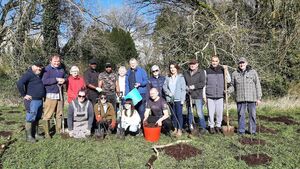Local Notes: 200 native Irish trees planted in Friary

Over 200 native Irish trees were planted in the grounds of the Friary in Ballyhaunis as part of the Choill Bheag or Small Wood project overseen by arborists from the An Taisce LEAF programme. The project was initiated by the Abbey Partnership and sponsored by the climate action and heritage desks at Mayo County Council.
The owner of the Supermacs franchise in Ballyhaunis says he needs to grow sales by at least ten percent per year in order to keep ahead of rising costs. The Supermacs building in Ballyhaunis is owned by the fast-food company, which sold the franchise 16 years ago to Dinal Swaris who also owns the Longford franchise.
Supermacs Ballyhaunis is hitting a target of 10 to 15 percent annual increase in sales, “but factor in a four percent rise in VAT and a four percent increase in wages and maybe a two percent annual increase in electricity and you see why you need a ten percent increase in gross revenue,” says Dinal Swaris.
Knock Shrine and the GAA Centre of Excellence are good for business and while Supermacs Ballyhaunis doesn’t deliver to homes, it does deliver to the Centre of Excellence.
“We go to them if there’s a big team visiting. We would not have the space to seat the large numbers but we can deliver to the canteen out there. If you let them out of town they go to other Supermacs. We go to serve them.”
The fact that Ballyhaunis doesn’t have paid parking is actually an advantage in drawing would-be customers to Supermacs, said Swaris. Likewise, he feels the opening last year of an Aldi store brings more footfall.
Owning two Supermacs franchises 20 years after coming to Ireland from Sri Lanka to work are the fruits of hard work for the Swaris family.
“In 2003 my wife and I came to Ireland on worker visas and went to work at Supermacs in Longford,” he explained. “We worked our way up.
“I became a manager looking after the Ballyhaunis and Longford franchises as a temporary manager. In 2008, the manager wanted to give up the Ballyhaunis franchise because he was from Meath and wanted to divide his time between there and Longford. I went to Pat [McDonagh, Supermacs’ CEO] and he agreed to give me a try.”
In 2009, with things working out in Ballyhaunis, McDonagh offered him the franchise in Longford which is slightly larger, with upstairs seating.
Like most businesses, fast food operators faced a series of cost rises in recent years. Swaris outlines a trifecta of cost challenges in late 2023: the [hospitality] VAT rate went from nine to 13.5 percent, higher electricity prices and a rise in the minimum wage. Factors that all hit at the same time.
Passing all the extra costs onto customers isn’t always an option, said Swaris. “There is a price point within which something will sell. You can’t pass all the cost increase on to customers, you have to absorb some percentage of it.”
Swaris thinks the rise in the minimum wage was necessary – but keeping staff remains a challenge.
“With the cost-of-living people the wages people got five years ago isn’t enough to do their shopping and that has a knock on effect. It’s understandable it has to be done. A minimum wage and a living wage which is three or four euros more than the minimum.
“You can get staff, yes, but the right person – it’s hard. Hospitality is a minimum wage industry and retaining staff is a big issue.”
The meat factories in Ballyhaunis create a labour pool but are also a major draw on labour, he said.
“It’s hard for a small business to compete with them.” As for further expansion of Supermacs, Swaris said he would love to have another store but it would depend on where the footfall is.
“There are 110 Supermacs branches now across the country and the newer branches are now in motorway plazas. Most towns now have one, so now the focus is on the transport system, the new roads.”
A night of Irish language films, dance and music is planned for the evening of Saturday, March 16, hosted by Ballyhaunis Community Council and Ballyhaunis Language Café at the Community Hall. The event is supported by Conradh na Gaeilge and all are welcome, including performers.
Local man Craig Hughes has set June 28-30 for this year’s Night and Day festival which returns to Lough Key Forest Park near Boyle with headline acts including The Undertones, Damien Dempsey and Bell X1 as well as Ash and Mick Flannery. Also on the bill is Ballyhaunis singer-songwriter Keith Plunkett.
Night and Day festival is run by Craig, a Dublin-based journalist, alongside his uncle Brendan Hurley from Gorthaganny. The festival organisers are also offering school-going musicians a chance to perform: artists still in school can enter a song contest with the winning entrants getting studio recording time. Night and Day festival started out three years ago in the grounds of Clonalis House in Castlerea before moving last year to Lough Key Forest Park.
Local manufacturing capacity and the diversity of Ballyhaunis’ population were key reasons for the town’s selection for the national government’s Town Centre First Programme, according to Anne McCarthy, regeneration officer at Mayo County Council. The scheme aims to revitalise rural towns by addressing dereliction and improving public spaces.
Ms McCarthy explained to this column: “Ballyhaunis is unique in its make-up considering its semi-rural location in the East Mayo. Ballyhaunis lays claim to being the most diverse town in Ireland with 49.8% of its population registered of non-Irish origin in the 2022 Census. The town is known for its welcoming outlook to all and serves as a model for integration nationwide.
“The County Mayo Development plan (2022-2028) identifies the importance of Ballyhaunis as a service town for a wide agricultural hinterland in East Mayo and into County Roscommon. The key economic activities in Ballyhaunis are relatively concentrated in several significant companies that relate directly and indirectly to the food processing and agri-machinery industries. The town also has a range of other manufacturing industries that includes furniture, plastics and kitchen construction. A range of medium to small retail shops as well as employment in the state sector and the financial sector provide important employment in the town,” explained Anne McCarthy.
“In 2019, Ballyhaunis was chosen to host a highly successful national Seminar on a Diverse Community, which was planned and managed by the Department of Justice & Equality and the Department of Rural & Community Development in partnership with voluntary Ballyhaunis-based organisations. What emerged clearly is that Ballyhaunis has shown that successful community integration is enhanced by economic development. Commercial decline is not caused by diversity; diversity is a global asset,” Ms McCarthy continued.
“The varying languages and home contacts of the diverse population of Ballyhaunis is a development resource enhanced by the fact that many migrants and asylum seekers are qualified professionals. The ‘Celebrating Diversity: Our future together’ report which emerged from the seminar, highlighted the potential of combining new integration actions, coordinating existing work and documenting learnings so that what works in Ballyhaunis might be replicated in other similarly sized diverse towns in Ireland.
“The Town Centre First Programme is the Government’s policy aimed at supporting the rejuvenation of Irish rural town centres to function as viable, vibrant and attractive locations for people to live, work and visit while also functioning as the service, social, cultural and recreational hub for the local community. There is a strong focus on addressing dereliction and vacancy and improving public spaces.”
Anne McCarthy went on to explain that the Town Centre First planning process incorporates the desires and needs of the community and takes a “bottom-up approach” to policy development.
“The results of this process will establish priorities, guide the proposals and action plan for project delivery: short, medium and long term goals.”
The Town Centre First plan will select Town Teams and Town Champions to lead out on the delivery of plans in collaboration with relevant agencies and the local authority. The Town Centre First Plan will initiate information gathering, a Town Centre Health Check and consultations with local communities, economic, sporting, youth and cultural organisations.
“The resulting plan will provide a blueprint for the future development of the town, strengthen funding applications and assist in securing necessary funding to deliver strategic projects,” added McCarthy.
Several full-time farmers around Ballyhaunis have been carefully considering transitioning their farms to organic farming, with more than one taking the plunge. A local beef farmer told this column how he cut his cattle numbers in half as he makes the conversion to organic-certified farming in order to avail of better farm payments from the government.
“I cut back on numbers because I’m not using fertiliser apart from slurry. But I make up the difference in the grant payments I am entitled to. Also I find I have more time for my family, it’s a better balance of life.”
Another farmer however considered the move but opted out due to the investment involved. “I would have to concrete over half the slats in my shed because they want you dry bedding half the stock, they want muck rather than pure slurry going out on land.”
Another factor which constrained the famer was weed control. “I use spray to stay on top of docks and I am worried the weeds will take off if I don’t stay on top of them.”
Congratulations to Paudie Gallagher who won €500 in the Ballyhaunis GAA 50/50 draw on February 25 with an envelope sold in The Clock. This week's draw is in Delaney's.





